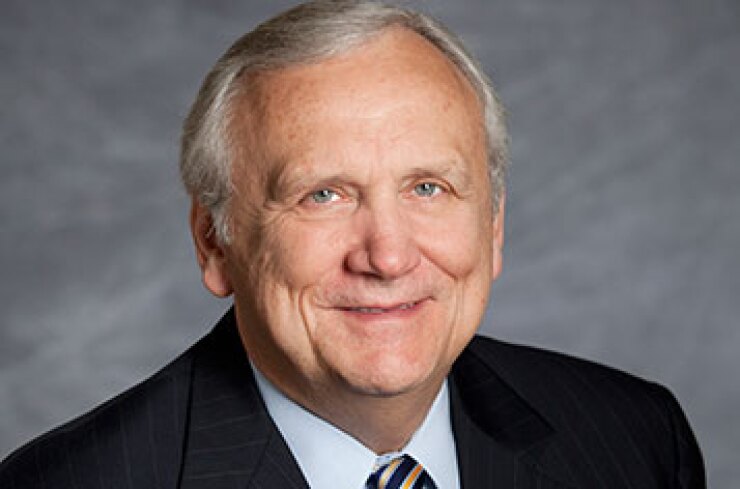
BRADENTON, Fla. – A nonprofit group plans to rescue a distressed commercial proton beam therapy venture in Atlanta, and turn its operation over to Georgia's only National Cancer Institute-designated center.
The Atlanta Development Authority has given preliminary approval to serve as the conduit issuer for up to $400 million of senior and subordinate bonds to finish and equip the 170,000-square-foot, three-story building near Emory University Healthcare in midtown where the advanced radiation treatment for cancer will be offered.
The facility will be financed and owned by Provident Resources Group Inc., a national nonprofit asset development and management firm with corporate headquarters in Baton Rouge, La.
"This is a project that has languished in midtown Atlanta for several years and is now being brought back to life," said Steve E. Hicks, Provident Resources' chairman and chief executive officer. "It will be completed."
Emory and the NCI-designated Winship Cancer Institute will be the clinical partners operating the Proton Therapy Center to treat adult and pediatric cancer with proton beam technology, which allows a more targeted attack on cancers than traditional radiation treatment.
For Hicks, who is also a former bond lawyer, investing in the Atlanta facility culminates a decade in which he developed a "passion" for proton beam technology, learning about it after working on two prior projects that failed to materialize.
He's also had a number of friends, including a bond attorney, who were treated successfully at other proton beam centers and helped convince him that Provident should be involved.
"What's so amazing about proton therapy in treating children is that the use of the proton beam does not damage any surrounding organs and tissue in a developing young child," he said.
Proton beam therapy, he added, is also effective in the treatment of prostate cancer in men and breast cancer in women, particularly left breast cancer because it limits the risk of damage to the heart.
The Atlanta project has been in the works for several years.
In May 2013, groundbreaking took place on the original Georgia Proton Treatment Center, which Emory and Winship Cancer Institute also planned to participate in.
At the time, they said the project would herald the arrival to Georgia of the "most advanced radiation therapy" in the United States.
"Proton beam therapy allows for more precise treatment of a tumor," Emory Healthcare said in an announcement then. "The most important benefit to proton beam therapy is that it limits damage to nearby tissue more than other radiation therapies currently available."
Emory and the Winship planned to treat patients and conduct clinical trials "to better understand the best uses for this advanced form of radiation treatment."
The Georgia Proton Treatment Center and three other centers in various locations were being developed by California-based Advanced Particle Therapy.
APT later encountered funding difficulties.
Three creditors from Texas filed an involuntary Chapter 11 bankruptcy petition against Georgia Proton Treatment Holdings LLC in the U.S. Bankruptcy Court for the District of Delaware on March 4, 2016, according to court records.
The creditors - Zeitgeist Capital LLC, Gryphon Resources Inc., and Cobalt LLC - said they lent $8.28 million to the debtor.
However, the bankruptcy case didn't go far.
On April 15, the creditors filed a joint motion to dismiss the case because Georgia Proton Treatment Holdings was "in the process of negotiating permanent financing" to open the Atlanta center and increase their recoveries.
Due to confidentiality agreements, no details about the permanent financing were presented to the bankruptcy court. Judge Kevin Gross dismissed the case on May 9.
Hicks said a group of investors in the Georgia Proton Treatment Center removed Advanced Particle Therapy from the transaction, and reached out to Provident Resources Group in an effort to complete the project with a nonprofit entity, instead of the original for-profit commercial venture.
"The investors we are dealing with are not the investors that tried to put the project into bankruptcy," he said. "We're working very well with them and we're acquiring the assets they have invested in. Our goal is to make them whole and complete the project so it can service the entire great Atlanta market."
Hicks said he is also working on developing a proton therapy center in south Louisiana and three other locations around the country that he cannot disclose due to confidentiality agreements.
"Nothing would make me happier for Provident than to bring a proton therapy treatment center to greater Baton Rouge and the south Louisiana market," which would also serve Mississippi, Alabama, and the northwest panhandle of Florida, he said.
Hicks said the proton centers are the "exciting" projects he wanted to do after practicing as a bond lawyer for 25 years.
He started the nonprofit Provident Resources Group in 1999.
It has 32 employees who manage assets in 18 states and the District of Columbia in the higher education, healthcare, housing, senior living, and state and local government sectors.
"We've done over $2 billion in projects around the country," Hicks said. "I also have the opportunity to work on some amazing projects like proton therapy and very challenging higher education projects around the country."
As a Louisiana State University graduate, Hicks said he was "very proud" of Provident's recent involvement with LSU's $575 million Nicholson Gateway Project.
Some $476 million of bonds were sold in several series by the Louisiana Public Facilities Authority.
The deal, LSU's largest privatization undertaking, closed in October.
Provident is the nonprofit borrower for the LSU project, which includes building 1,531 beds in seven on-campus residence halls, a 10,000-square-foot recreation facility, 38,000 square feet of retail space, and 1,625 parking spaces.
The firm's most recent project was a public-private partnership with the University of Massachusetts Boston to develop a 1,082 bed student housing facility and a dining facility.
The Massachusetts Development Finance Agency issued $130 million of revenue bonds for the Provident-UMass project, which closed in early November.
Hicks said endeavors, such as the Georgia proton beam project, are rewarding.
"When you have a chance to work on a project like this, and you know it will impact in a large market area, it's exciting," he said. "It's a lot of fun being involved and to see it materialize."
The Atlanta Development Authority is expected to give final approval to the deal at its Feb. 16 meeting, according to spokesman Matt Fogt.
Citi, senior manager for the financing, will determine the ultimate size of the bond issue and date of pricing.
However, Hicks said that his agency is targeting a $325 million to $350 million deal using an as-yet undetermined combination of tax-exempt and taxable bonds.
Closing is expected April 1.
Bond proceeds will be used to finish the Atlanta proton treatment center, construct a 165-space parking deck with about 4,000 square feet of ground-level retail space, provide start-up working capital, and acquire the "ownership interest" of the current investors.
Because of the construction risk related to completion of the facility, it has not been determined whether ratings will be obtained.
"We're very proud to be associated with an institution that is internationally known like Emory, to have them as our clinical partner and to be able to serve a large region, not just greater Atlanta, but a large portion of the Southeast," he said.
Piedmont Securities LLC is the structuring agent for Provident Resources Group and Georgia Proton Treatment Center.
Bond counsel is Butler Snow LLP.
Underwriters' counsel is Nixon Peabody LLP.
Fishman Haygood LLP and Holland & Knight are Provident's legal team.





